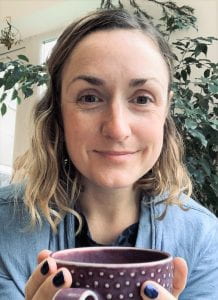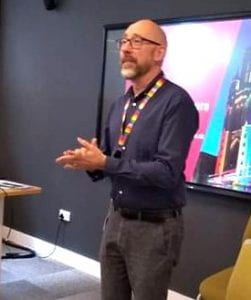In a nod to the Big Issue’s regular feature Letter to My Younger Self, we’re asking staff to think back to their own experiences as a student and tell us what advice they would give to their undergraduate selves.
This month we hear from Beckie Arden, Study Skills Tutor.
What and where did you study?
Biology and French at Sussex University.
Which turned into just Biology at Sussex University.
Which then became Human Science at Sussex University.
Did you experience culture shock when you started university?
Yes! I found university a huge challenge in my first year. I was a hardworking student from a small rural town in Devon. I worked hard because I was terrified that if I didn’t, I’d fail. However I also felt that all my academic success was down to chance. I assumed it was luck that led to my GCSE success, or my strong A ‘levels, none of it could possibly be down to actual ability or hard work. Luckily I had some very intuitive teachers at school that spotted my ‘imposter syndrome’ and tried their best to help me. Things were a bit different at Uni. Huge lecture halls, the conveyor belt of practical classes, brief and infrequent seminars or tutorials. No one knew who I was or what I was thinking. I had to work very hard to overcome my insecurities myself. I nearly quit many times in that first term. I very nearly didn’t return after the winter break. But then I managed to take control of a few things. I changed my accommodation as I was very unhappy in my first flat. I managed to drop the ‘French’ part of my degree, because it was just not working out (I hadn’t actually done French A’level). I found some balance. Things seemed a bit more manageable. And I felt that I had some control over my journey through this very unfamiliar world.
What was your biggest failure and what did you learn from it?
So after two years of a Biology course that I was succeeding in but wasn’t very excited by, I discovered my perfect degree course; Human Science. It involves five major subjects – Biology, Anthropology, Philosophy, Psychology and Linguistics. Look it up. It’s amazing.
But I was a scientist. I had aced my science A’levels and that was why I had applied to do science at university. I could do science. I knew what was expected. So when I got 41% for my first anthropology essay (honestly I’m not even sure I knew what anthropology was at that point) it was quite a shock. I realised that applying the same approach to studying and writing in anthropology as I had in biology wasn’t going to work. I needed to learn how to read, think and write for anthropology. I came to see that for each of my new subjects, there was a skill-set that I had to employ, a way of doing things for each that was distinct. It was my first experience of learning how to learn.
What are you most proud of about your time at university?
That I persevered. I was unhappy at the start, but I changed things and made things better rather than giving up. I asked questions I didn’t know I could ask – like ‘please can I change my degree’. I carved my own path through a very alien setting, despite the culture shock and the imposter syndrome, and I achieved a 1st class degree on a course that even today I could talk about for hours because I loved it so much. I’m proud that I made it work.
What was the best bit of feedback you received?
When I failed my driving test I was told ‘failure will help you recognise what to do to succeed’. I wasn’t keen on hearing it at the time, but this feedback came flooding back to me when I struggled with that anthropology essay. I had been terrified of failure. This fear underpinned the mammoth efforts I put into my work. However I learned that my understanding of how to study and how to achieve was unlocked once I had experienced failure.
What advice would you give to your undergraduate self?
Take every opportunity offered and keep your ears and eyes open for what’s available. I didn’t use nearly enough of the support that was available as I just didn’t know it was there, and I didn’t join nearly enough clubs or societies, as I just didn’t realise that you could. Also maybe don’t wear tin foil and cling film to the freshers ball, and go easy on the free margaritas on salsa night.


